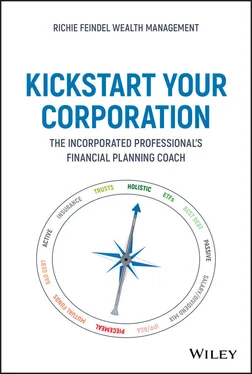Choosing Your Corporation's Year-End and Maintaining Your Corporate Records
Once you are incorporated, you will need to designate a fiscal year-end for your corporation. If you're looking to keep things simple, choose a corporate year-end of December 31, the same as your personal tax year-end.
There can be some advantages, however, in choosing an off-calendar year-end. For example, with an off-calendar year end of July 31 or later, you would be able to defer paying taxes for up to 179 days. This means you could declare a bonus in the company fiscal (non-calendar) year, but not actually take the money into (taxable) personal income into the following (calendar) year.
Your professional corporation will file its own return and pay its own taxes. The corporation's tax returns are due six months after your designated corporate year-end, but the final balance of any tax owing is due two to three months after your corporate year-end. 2 As you will now be an employee of the corporation, and no longer a self-employed individual, your personal taxes will be due by April 30—and not the deadline of June 15 granted to self-employed individuals and their spouses.
A mistake that's often made in the first year of incorporation is failing to file for dividends, recorded on T5 slips, by February 28 of the following year. This oversight will result in a late fee of the greater of $100 or $10 per day. 3 February 28 (or 29 in a leap year) is also the date for filing T4 slips. You will need to keep your company records for at least seven years—including invoices, receipts, cheques, and documentation of your salaried employees' duties and hours worked. 4
When Does It Not Make Sense to Incorporate?
Although there are powerful potential benefits to incorporating your professional practice, there are also some (limited) situations in which it is advisable not to incorporate.
If you are retired and have no intentions of ever working again, ever, then incorporating won't be the right choice. To be crystal clear: I don't mean if you are retiring in one year, or slowing down or moving to part-time work. That's because there could still be many thousands in tax savings in those final years that could significantly change your corporate/RRSP mix, estate plans—and reduce your future tax bill, once you really are retired, as well.
In 2014, I started working with a physician in his 70s. Although he was in the process of reducing his working hours, we still had him incorporate his medical practice. By taking this one action, over the five remaining years of his working life, he achieved the following results:
1 His RRSP balance was reduced by $200,000, reducing the income he would take in the form of RRIF withdrawals (and thus the taxes he would eventually pay);
2 His corporate investment account balance was $250,000—giving him more control and lower (eventual) taxes;
3 The expected taxes payable on his estate were reduced, increasing his children's inheritance; and
4 He received five years of government benefit payments totalling close to $40,000—none of which he would have received had he not followed our advice.
If you plan on working less than a year in Canada and then move permanently to a new country,then you should not incorporate.
Notice I didn't say “if you plan to move to another province,” as your corporation can be portable. That is, the benefits of incorporation all hold true if you work in Ontario for, say, one year and then work in Alberta for the following 20 years. While oftentimes a share restructuring may be required (given the different rules in different jurisdictions), unless you are planning on working in both provinces, in most cases it is a better option to have one corporation that moves from Province A to Province B than to set up a brand-new corporation. This is called “continuing” the corporation—a corporation is said to have continued when it has moved from one jurisdiction to another. Keep in mind, however, that different regulatory bodies may have different requirements.
If you make less than $50,000 per year and you do not have a partner who earns an income,you should not incorporate. In situations where your partner does have a high income and you can incorporate, there are ways to make this beneficial for you as a collective unit.
If you are an American citizen working in Canada,you should not incorporate until you understand the pros and cons, including excessive filing requirements—as the United States and Eritrea are the only countries that tax based on citizenship, resulting in annual filings for the prorated share of the passive income earned. Before you make the decision of whether to incorporate, you will need to understand which investment strategies can be used, but also cannot be used , given your citizenship and tax position.
Additionally, in December 2017, the United States implemented a transition tax that could be punitive for U.S. citizens working in Canada. With that said, I have worked with families for whom incorporation was certainly worthwhile—as in many other things, the devil is in the details.
If you have student debt,should you still incorporate? While student debt cannot be transferred to a corporation (given the debt is not tied to a tangible asset), it's still almost always worthwhile to incorporate . Why pay 20–40% more in taxes (by remaining unincorporated) to save 4% in interest (even though national student loan interest gives you a tax credit)? However, if you're facing a substantial student loan balance, you could look into federal student loan forgiveness programs that forgive up to $40,000 of debt in a five-year period if you work a minimum of 400 hours in an underserved or remote community. 5
What If You Have No Small Business Deduction?
While many professionals do not receive the small business deduction (SBD) as they are associated with a partnership (i.e., most incorporated lawyers with a large firm), most of the benefits from incorporating still apply. (Note that the 2016 federal budget introduced a number of changes to corporate taxation when income is earned in a partnership or revenue is received from another company.)
Often I see physicians who are working in partnerships where they share the SBD have solutions put forward to fix this problem, but require a majority of their colleagues to be on board. In most cases it does make sense to enter into a cost-sharing arrangement or the advisable solution put forward by the legal team.
At first it seems costly with no SBD, as your corporate taxes go up from 12.2% to 26.5% (in Ontario; this varies per province). However, you do receive an enhanced credit on your dividends that can range from 8% to 12% less in personal taxes, making up for much of that loss in having no SBD.
How Does Purchasing a Home Fit into My Incorporation Timeline?
What if you are buying a home in six months to two years' time—does it still make sense to incorporate now? In a word, yes. Your home is a leveraged investment that grows tax-free, and, because of these characteristics that are unique to the principal residence, will likely be one of your best long-term investments … like a “super-TFSA,” if you like.
You normally need between 25% and 35% of the purchase price as a down payment—and the fastest way to save the down payment is usually to incorporate.
(As a side note, I also advise clients that it is okay to potentially overreach a little more than normal on their home purchase price, to avoid having to purchase an intermediary home, and then eventually sell that intermediate home in order to purchase a long-term or “forever” home within a few years. That's because the transaction costs in real estate, such as real estate commissions paid on the sale, can be significant. When all the transaction costs are factored in, they might represent up to 10% of the purchase price—a cost that can be avoided if we could somehow speed up the process to get into that long-term home.)
Читать дальше












